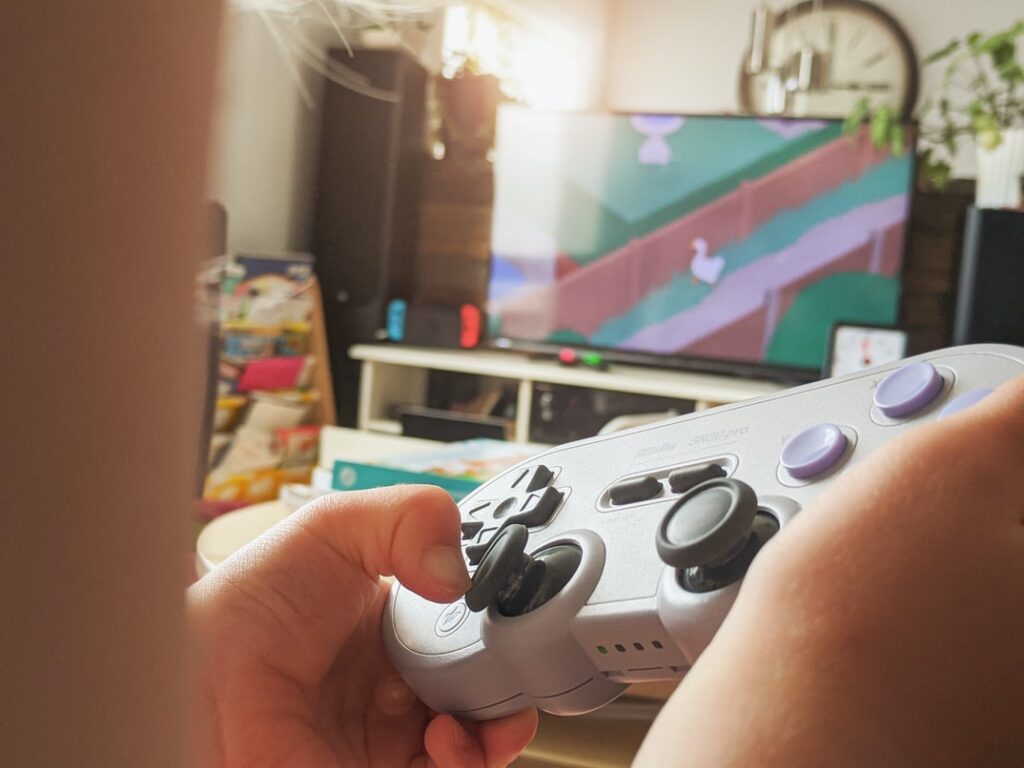
Screens and screen time, along with video games, YouTube, Snap Chat, Instagram, Facebook and Tik Tok have become a seemingly permanent (and pervasive) part of our daily lives and the lives of our children.
I have been asked to blog about this topic quite a few times, but the reality is that I grew up (as did many of you parents out there I am sure) in a world where such entities just didn’t exist and although I talk to families about this a lot in clinic, to write a blog, I needed to read the evidence!
Had to do a lot of reading around this topic and interestingly (I had no idea) there seems to be 2 distinct camps of thinking (and I know which camp I have firmly been in):
Camp 1: Video game addiction results in profoundly negative consequences:
Video gaming can result in addiction, meaning that children crave and ultimately give gaming increasing priority at the expense of other interests such as physical activity, self-care, social interactions and other activities of daily living. It can teach children to be violent, it reduces their attention, memory and ability to effectively regulate themselves emotionally, lower mood and increase irritability.1
Camp 2: Video gaming is beneficial for brain development by increasing cognitive function, specifically in terms of visual attention and short-term memory2, reaction time3, and working memory.4
I’ve just spent the last few hours reading through articles and studies to try to figure out why there are 2 such opposing trains of thought around this. Certainly, my clinical experience with kids, parents and video games has not the most positive one. But perhaps this is because people only really present to their paediatrician when there is a problem, rather than when things are going well. I should note also that all the studies demonstrating BENEFICIAL brain effects, were studies performed in adults (and NOT children).
Most parents will recount to me how their child will spend 6-15 hours per day on their X-box or Nintendo, and that when they are asked to turn it off, they get angry, disrespectful, or even threaten their parents and become physically violent. Many of us have read about such cases or have had experiences which show that video games have addictive power. While anecdotal evidence is not scientific research, real world experience and the growing awareness of other behavioural addictions explain why the concept of video game addiction is becoming increasingly accepted. Recently, the World Health Organization added “gaming disorder” to its official list of diseases.
“Gaming disorder is defined … as a pattern of gaming behaviour (“digital-gaming” or “video-gaming”) characterized by impaired control over gaming, increasing priority given to gaming over other activities to the extent that gaming takes precedence over other interests and daily activities, and continuation or escalation of gaming despite the occurrence of negative consequences.”
– World Health Organization5
So when does gaming/screen time become a problem and when does it become an “addiction?”
Addiction involves craving for something intensely, loss of control over its use, and continuing involvement with it despite adverse consequences.6 As a paediatrician, gaming/screen time becomes a problem when it interferes with that child’s ability to function and participate in normal daily activities such as family and social events, school work, sport and self-care. Excessive gaming and screen time can drastically affect the quality of a person’s life in a negative way because it can influence important aspects of living that literally can affect EVERYTHING ELSE, like sleep patterns, mood and mental health, eating/appetite and that individual’s ability to relate to other people (both with family and with friends).
The studies that I have had a look at today are too numerous to summarise in detail but I will pop them in a list at the end of the article for interest. Certainly there seems to be some evidence that “moderate” video gaming can positively affect a child’s brain, (references 2-4) ( but there is also evidence that “excessive” gaming (and its subsequent withdrawal syndrome) can adversely affect emotional regulation, mood, episodic memory, factual memory, problem solving, processing speed, visual spatial organization, sustained sequential processing, working memory, novel problem solving, basic reading skills, written expression skills and results in worse clinical attention.1,5,6,7
It is interesting to note that in all the reading that I have done, I could not distil a clear definition of “excessive” or “moderate” in the context of screen time of video gaming.
With regard to addiction, similar areas of the brain are affected as in gambling or substance dependence. Dopamine is the neurotransmitter in our brain that regulates our experience of pleasure. Video games are designed to make our brain release a constant stream of dopamine, with random bursts. However, over time, our brain gets used to this continuous supply, and it requires more and more to feel equally stimulated.
Our brains have a challenge-reward pattern built-in where we feel good when we overcome an obstacle. This is called the “Triumph circuit.” Video games exploit this circuit by presenting us with a challenge, and then giving a reward for conquering the challenge. This in itself is not the issue so much as that an addict loses motivation to achieve goals in REAL life, because they get their sense of achievement/satisfaction from video games.7
Video games are very good at repressing negative feelings.7 If a child is having a hard time at school (be it by bullying, learning difficulties etc) they can use a video game to make the negative emotions go away. While again, this in itself in the short term might not be such a bad thing, in the longer term it is when the child does not learn strategies to DEAL with those emotions and gaming becomes the (maladaptive) coping mechanism, then this is not healthy.
Overall, reading the studies and systematic reviews, it does seem that historically, games have often been praised or demonised, without real data to back those claims. Moreover, gaming is a popular activity, so of course everyone will have strong opinions on the topic. The reality is that video games are likely have both positive (eg visual and motor skills) and negative (eg addiction) effects on the brain and that more research and stronger more robust studies need to be conducted on what aspects of games effect which brain areas and why.8
According to experts, some of the most addictive online games are9:
- Fortnite Battle Royal
- World of Warcraft
- Battlefield
- Farmville
- Call of Duty
- Minecraft
- Angry Birds
- Solitaire
Less bloody alternatives
If you have younger kids at home for whom violent video games are not appropriate, or you (like me) just don’t like the idea of exposing your kids to unnecessary violence, there ARE other options. The “Great Schools” website (https://www.greatschools.org/gk/articles/child-brain-development-and-video-games/) suggests steering younger children toward “real-time strategy” (RTS) games, such as Civilization, Risk, Age of Empires, and StarCraft. Quest and adventure games that use strategy and problem-solving skills can challenge a child’s cognitive ability, without demonstrating that violence is the way to achieve your goals.
So now the recurrent question I get in clinic without fail, on every day that I work:
How do I get my child to stop playing video games?
One of the biggest obstacles that parents run into when trying to get their child to stop playing video games is when they say, “No gaming for a week. Read this book instead” or something along those lines. I know this, because I have been that parent (not about gaming, because my kids are too little to game, but about screen time).
The hard and unfortunate truth is that the child will not enjoy and engage with that book in the same way they would with an interactive game or screen, and certainly not in the same way that we as adults can engage with a book.
In terms of parenting principles, you must understand that when you give your child a small alternative to gaming, they are unlikely to enjoy it. You have to entice them away from video games in a significant manner to get them to have a healthy dopamine-functioning brain. In other words, to break a child’s video game addiction, you need to give them a difficult but exciting task. This is due to how video games affect the triumph circuit in our minds. Triumph requires adversity, so your child will be the most responsive to activities that both challenging AND fun.7
Some examples of activities might be a high ropes course, sea kayaking, boogie-boarding, mountain biking, hiking or rock climbing. These activities are high adrenaline and often children who love gaming, thrive on this excitement. It gives their brain a similar dopamine response as gaming. It is engaging, healthy, and something you can do as a family.
Remember that you don’t need to shut down their gaming habit completely. It is enough to engage your child in a way that they find enjoyable. Regular sessions with a psychologist with experience in cognitive behavioural therapy in the context of addiction is also very important.
Summary of important points
- There are both pro’s and con’s to video game usage
- More research needs to be done regarding effects on brain function – there is conflicting data in current studies and research
- How video games affect cognition (problem solving), attention etc depends on WHAT kind of game is being played and what is being watched
- This is distinct from how it affects emotional regulation, mood, sleep etc
- The positives and negatives to gaming are NOT mutually exclusive
- It doesn’t have to be all or nothing – playing 8 hours of video games a day is NOT healthy, whereas playing 1-2 hour a day may have less of a negative impact.
- Gaming addiction (where it is affecting the young person’s ability to function in life) is quite different to video gaming when games are played in a controlled manner (ie there are restrictions on time spent and type of game played)
- There are a LOT of different types of video games out there
- Violent war games
- Strategy and problem solving
- Building, construction and artistic/creative games
- Exploration, economic management, adventure quests
- You have the ability to choose the right kind of game for your child
- Put boundaries in around usage (time limits, type of games) BEFORE you start to allow them access
Overcoming a gaming addiction
- YOU need to be the parent (don’t let your child dictate the rules to you), and YOU need to stay a step ahead of your child
- It won’t necessarily be easy.
- You need to provide an alternative activity/activities for your child that provides both challenge (a difficult task that is also engaging) and reward in order to engage the “triumph” circuit in the brain – in order to triumph you must overcome adversity. You will need to make this a regular event
- Cognitive behavioural therapy approaches can also help
References:
1. Farchakh Y, Haddad C, Sacre H et al. Video gaming addiction and its association with memory, attention and learning skills in Lebanese children. Child Adol Ment Health. 2020; 14: 46; accessed at https://capmh.biomedcentral.com/articles/10.1186/s13034-020-00353-3
2. Wilms I.L., Petersen A., Vangkilde S. Intensive video gaming improves encoding speed to visual short-term memory in young male adults. Acta Psychol. 2013;142:108–118. doi: 10.1016/j.actpsy.2012.11.003.
3. Steenbergen L., Sellaro R., Stock A.-K., Beste C., Colzato L.S. Action Video Gaming and Cognitive Control: Playing First Person Shooter Games Is Associated with Improved Action Cascading but Not Inhibition. PLoS ONE. 2015;10:e0144364. doi: 10.1371/journal.pone.0144364.
4. Moisala M., Salmela V., Hietajärvi L., Carlson S., Vuontela V., Lonka K., Hakkarainen K., Salmela-Aro K., Alho K. Gaming is related to enhanced working memory performance and task-related cortical activity. Brain Res. 2017;1655:204–215. doi: 10.1016/j.brainres.2016.10.027.
5. https://www.who.int/news-room/q-a-detail/addictive-behaviours-gaming-disorder
6. https://www.addictioncenter.com/drugs/video-game-addiction/
7. https://www.healthygamer.gg/blog/how-to-break-a-childs-video-game-addiction
8. Marc Palaus, Elena M. Marron, Raquel Viejo-Sobera, Diego Redolar-Ripoll. Neural Basis of Video Gaming: A Systematic Review. Frontiers in Human Neuroscience, 2017; 11 DOI: 10.3389/fnhum.2017.00248
9. https://hampshirecamhs.nhs.uk/issue/gaming-addiction/
10. https://www.greatschools.org/gk/articles/child-brain-development-and-video-games/
11. Gong D, Yao Y, Gan X et al. “A Reduction in Video Gaming Time Produced a Decrease in Brain Activity.” Front Hum Neurosci. 2019; accessed at https://www.frontiersin.org/articles/10.3389/fnhum.2019.00134/full
12. Cardoso-Leite P, Bavelier D. Video fame play, attention and learning: how to shape the development of attention and influence learning. Curr Opin Neurol. 2014 Apr;27(2):185-91. doi: 10.1097/WCO.0000000000000077. Accessed at https://pubmed.ncbi.nlm.nih.gov/24553464/
13. Colzato L, Van Den Wildenberg W, Zmigrod S et al. Action video gaming and cognitive control: playing first person shooter games is associated with improvement in working memory but not action inhibition. Psychol Res. 2013 Mar;77(2):234-9.
doi: 10.1007/s00426-012-0415-2. Epub 2012 Jan 22. Accessed at https://pubmed.ncbi.nlm.nih.gov/22270615/

